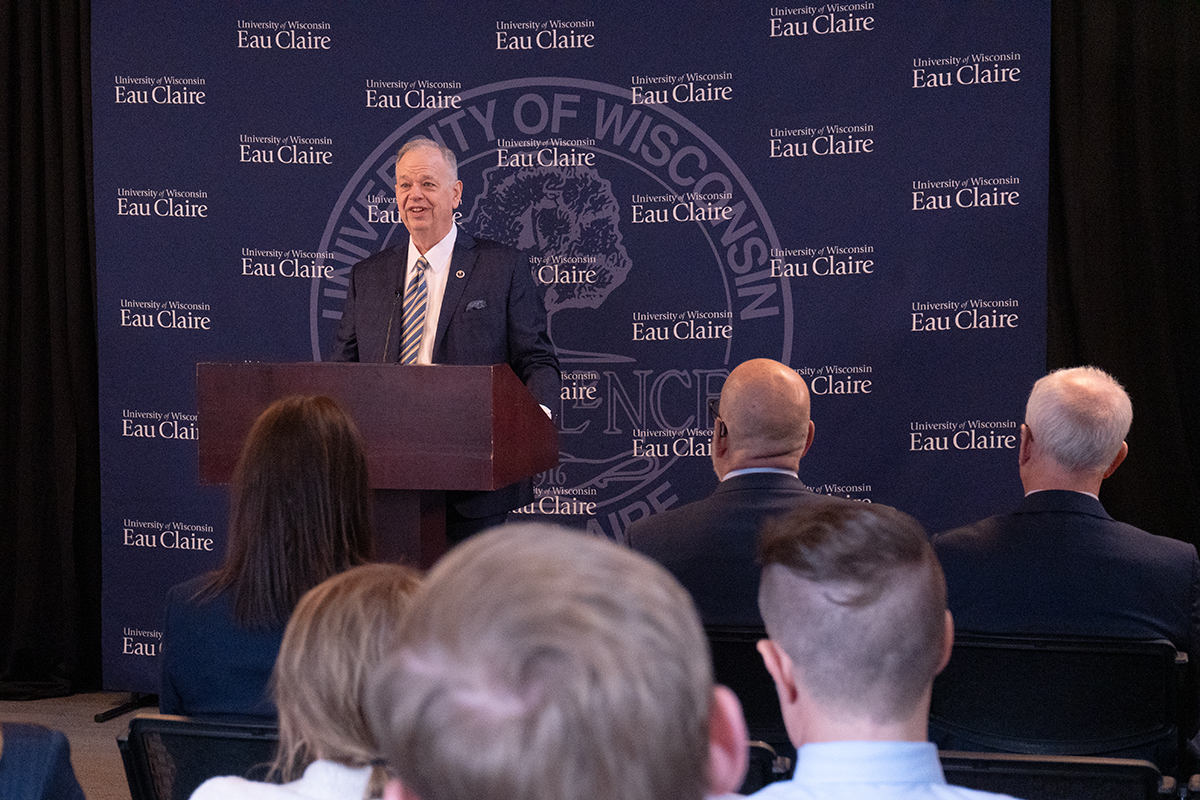It only takes consuming two milligrams, similar to five to seven grains of salt, of fentanyl for the dose to be lethal. Fentanyl is a synthetic opioid 50 to 100 times more potent than other opioids and is legally used to treat medical patients with severe pain.
The drug was initially introduced to the medical field in the 1960s as a new intravenous analgesic. Now, it is the leading cause of death for Americans ages 18-45.
Over time, illicit fentanyl, which is manufactured illegally and smuggled into the United States from other countries, became a top-seller within the illegal drug market.
In the summer before the fall 2022 academic year, UW-Eau Claire placed a total of 19 anti-overdose kits around campus in every residence hall, Hilltop Center, Davies Center, the Library, McPhee, Fine Arts, Zorn Arena and on the Barron County Campus.
These kits were placed on a number of campuses within the Universities of Wisconsin as a result of a big push for opioid overdose prevention. This push was a result of the death of two UW-Milwaukee students who accidentally purchased counterfeit pills.
Christy Prust, a health educator at UW-Eau Claire, said the kits were placed in a collaborative effort to make the campus safer and to raise awareness for opioid misuse and overdose.
“There was a group of individuals from all of the different universities in Wisconsin that worked on it. There was a very large campaign and posters that were put out,” Prust said. “And so Chancellor Schmidt agreed to getting the Narcan dispensers put on our campus.”
Brian Drollinger, director of risk management, safety and sustainability, played a part in the conversations surrounding getting the kits placed around campus. He said that the UW-Eau Claire administration felt it was time to take action.
“We decided it was time to take action and discover what we can do to help get information and resources to campus to help reduce those situations,” Drollinger said. “It was apparent that installing Narcan boxes throughout campus was an important tool in helping our community get access to the kits.”
Since the placement of the anti-overdose kits around the UW-Eau Claire campus, the profile of overdoses both in the country and on college campuses has changed. In 2022, the Center for Disease Control and Prevention reported that nearly 70% of drug overdose deaths were a result of illegally manufactured fentanyl.
Also within the greater Eau Claire community, steps have been taken to aid the rising fentanyl and opioid crisis.
The health department invited the public to a free Narcan training and opioid workshop on Aug. 28, in preparation for International Overdose Awareness Day on Aug. 31.
In summer 2023, the Eau Claire City-County Health Department partnered with the Eau Claire County Sheriff’s Office with grant funding to place a refurbished vending machine in the Eau Claire County Jail lobby. The harm reduction vending machine dispenses free Narcan and fentanyl test strips.
Six months after the machine was placed, the health department reported 503 boxes of Narcan and 250 fentanyl test strip kits dispensed from the machine.
Sarah Dillivan-Pospisil, public health specialist with the Eau Claire City-County Health Department, works within the world of overdose prevention.
“My primary focus is opioid and overdose prevention,” Dillivan-Pospisil said. “I provide education throughout Eau Claire County to increase knowledge and awareness of what opioids are, local data, signs of an opioid overdose, prevention, harm reduction and local resources.”
Dillivan-Pospisil said resources like the vending machine are important to have accessible for people in the community, and can save lives instead of lose them.
“We have lost community members — people who are neighbors, friends, and family — to overdose,” Dillivan-Pospisil said. “Between 2018 and 2023, 100 drug overdose deaths happened in Eau Claire County. 78 of those overdose deaths were related to opioids. By having these lifesaving tools available, we know we can save lives.”
With actions being taken for the greater Eau Claire community, the concern now is translating these steps into something accessible for students and staff on the UW-Eau Claire campus. While the availability of Narcan kits and fentanyl test strips was made on campus in 2022, additional steps are now being taken following the rise in fentanyl-based overdoses and deaths.
Prust and Dillivan-Pospisil, who now collaborate often, have worked together on a number of public health programs and events.
The pair recently organized an opioid overdose and Narcan training open to all of campus from 1-2 p.m. Tuesday, Oct. 15 in Centennial 1614.
“Sarah and I got together to start the training on campus,” Prust said. “The training will cover local data about opioid usage and overdoses and how to recognize the signs of an opioid overdose, as well as the steps to respond. This includes how to use Narcan nasal spray and where to locate the different boxes on campus.”
In addition to this, Prust made efforts in the past to install a harm reduction vending machine similar to the one in the Eau Claire County Jail lobby.
“Last year, [there was] a lot of talk trying to collaborate with different people on campus to get a vending machine, not only with Narcan and fentanyl test strips, but other health-related items,” Prust said. “I was really struggling to get people to partner with and to figure out how to get a vending machine, where we would buy it from, who would fill it, who would pay for it, those types of things.”
Despite the minute progress made so far, Prust still has hopes to get a harm reduction vending machine put on campus, especially as students continue to inquire about it.
“It’s something that I’m going to get started back up, because it’s something I was really passionate about,” Prust said. “And we’ve had students ask for it.”
While students wait for things like this to come to fruition on campus, Drollinger said it is important to stay knowledgeable on opioid misuse and what to do in a potential overdose situation.
“The campus community should get familiar with the signs of an overdose, know where the locations of Narcan kits can be found and know that if they should witness an overdose, it is always suggested to call 911,” Drollinger said.
Similarly, Dillivan-Pospisil shared the importance in creating productive dialogue regarding not only overdose treatment, but the substance misuse that comes first.
“It is important to address this issue across the spectrum from prevention to harm reduction to treatment,” Dillivan-Pospisil said. “We can save lives.”
Additional Resources:
- Eau Claire City-County Health Department: Opioid Data Dashboard
- Substance Use Prevention Education (SUPE): Youth/Student Resources
- National Institute on Drug Use: Opioid Reversal Medications
- U.S. Food & Drug Administration: Timeline of Events Addressing Substance Use and Overdose Prevention
Braun can be reached at braunee6220@uwec.edu.









